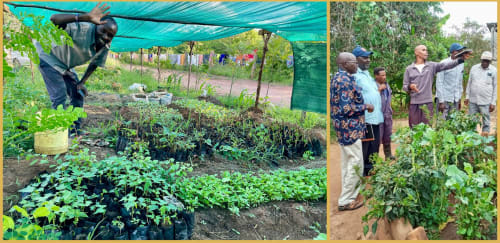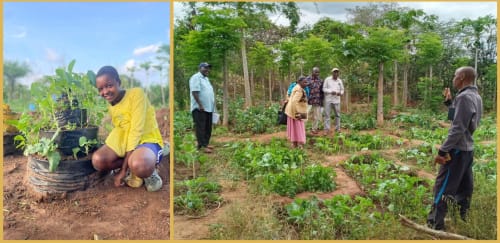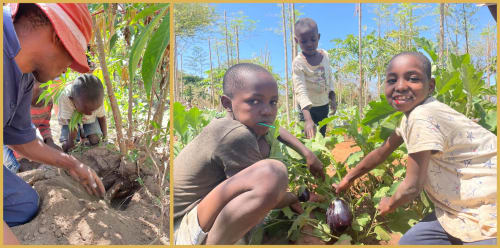Permaculture for a sustainable future – Part 2

Overcoming the challenges of the climate crisis at the Maua Villa children’s home and the region
The climate crisis poses a huge challenge for the Maua Villa children’s home and the people in the region. Droughts and water shortages are affecting crop yields and threatening the security of food supplies. Changing climatic conditions endanger biodiversity in the animal and plant world and the livelihoods of communities that depend on an intact ecosystem. However, forests, soils and other natural resources are not only suffering from changing climatic conditions, but also from the ignorance and lack of education of the people living in these areas. The majority of them still use wood as their primary source of energy, which is not replanted.
Together for sustainable agriculture
Together with the Food Forest Network – Sarasale e.V. and Hungry Cities Permaculture – we are currently working on a concept on how we can contribute to education for sustainable development in Kenya. Sarsarale e.V. is a non-profit organization that has been successfully setting up and supporting climate and environmental protection projects in the Global South for 15 years. Hungry Cities Permaculture is a collective of permaculture designers and trainers from Berlin, Potsdam and Brandenburg. In order to achieve the greatest possible impact, we want to implement a project based on three pillars.
- Part 1: Demonstration Farm (funded)
Design and construction of a complex agroforestry system (so-called food forest) in Maua Villa. - Part 2: Permaculture Design Course
Certified permaculture design course with a focus on complex agroforestry systems for farmers in the community. - Part 3: Roadshow
Roadshow to various permaculture projects to strengthen networking and exchange of experiences.
The aim of the permaculture design course is to enable participants to practice land design in a resilient and sustainable way. Only together and with the support of as many people as possible can we transform the existing system. The main aim of the design course is to promote an understanding of natural cycles and how to recognize them. The main focus is on the basics, principles, methods and tools of permaculture and complex agroforestry systems.

What are complex agroforestry systems?
A complex agroforestry system is a form of agriculture that mimics the natural succession of nature, i.e. the return of animals, plants and fungi to a destroyed ecosystem. It relies on cumulative processes of life to restore the fertility of ecosystems. An ecosystem provides us with food, fiber, oils and wood for building and fire. It also purifies air and water, increases biodiversity and revitalizes the soil. Taken together, the systems are much more resistant to drought, floods, wind and forest fires than monocultures. We are convinced that it is important to demonstrate and utilize these wonderful properties in demonstration projects as an important building block against the crises of our time.

Permaculture design course as an educational measure
In our 14-day course, participants are given a theoretical and practical introduction to the basics of permaculture. The focus of the course is on the establishment of complex agroforestry systems (so-called food forests), which represent a multifunctional solution for transformative agriculture.
We promote sustainable agriculture and lifestyles by creating such diverse and resource-efficient ecosystems. Complex agroforestry systems (so-called food forests) can improve soil fertility, ecological diversity and water storage capacity and thus make a decisive contribution to food security. In the long term, complex agroforestry systems can have a positive impact on the local climate.
Participants will receive all the knowledge they need to create their own food forest at home after the course.
You make the difference
Your donation enables the people in Maua Villa and the region to have secure access to food and valuable knowledge in dealing with nature. Even a little support makes a big difference!
The total cost of the course is around EUR 35,000, which we intend to finance through funding. The course will be free of charge for all participants, which is why we will not generate any income. The total costs therefore include all expenses for the preparation, implementation and follow-up of the course, as well as the fees for speakers, accommodation, food & drink, flights, visas and all other costs incurred for the course.
If you would like to support our project, we would be super happy to receive your donation.